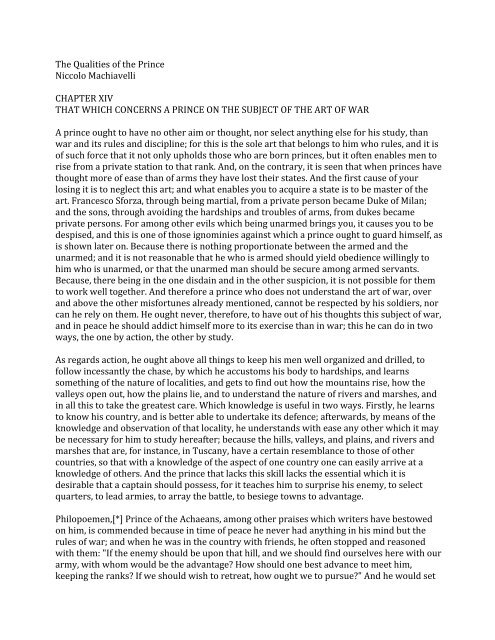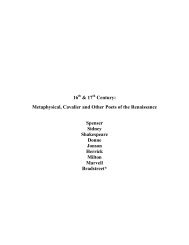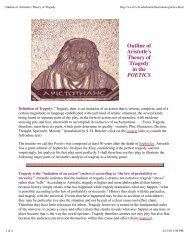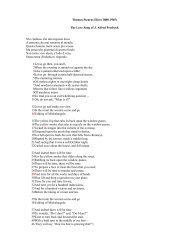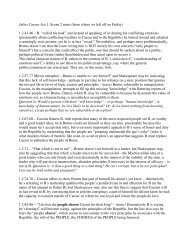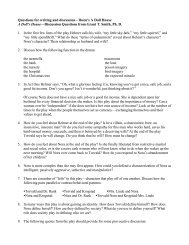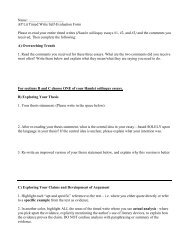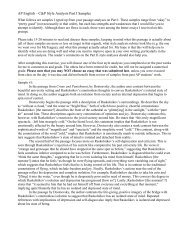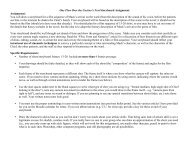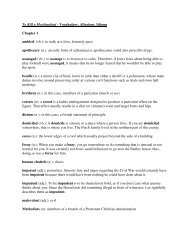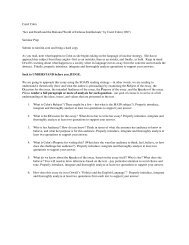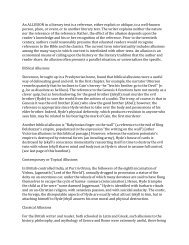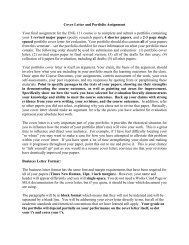The Qualities of the Prince Niccolo Machiavelli CHAPTER XIV THAT ...
The Qualities of the Prince Niccolo Machiavelli CHAPTER XIV THAT ...
The Qualities of the Prince Niccolo Machiavelli CHAPTER XIV THAT ...
You also want an ePaper? Increase the reach of your titles
YUMPU automatically turns print PDFs into web optimized ePapers that Google loves.
<strong>The</strong> <strong>Qualities</strong> <strong>of</strong> <strong>the</strong> <strong>Prince</strong><strong>Niccolo</strong> <strong>Machiavelli</strong><strong>CHAPTER</strong> <strong>XIV</strong><strong>THAT</strong> WHICH CONCERNS A PRINCE ON THE SUBJECT OF THE ART OF WARA prince ought to have no o<strong>the</strong>r aim or thought, nor select anything else for his study, thanwar and its rules and discipline; for this is <strong>the</strong> sole art that belongs to him who rules, and it is<strong>of</strong> such force that it not only upholds those who are born princes, but it <strong>of</strong>ten enables men torise from a private station to that rank. And, on <strong>the</strong> contrary, it is seen that when princes havethought more <strong>of</strong> ease than <strong>of</strong> arms <strong>the</strong>y have lost <strong>the</strong>ir states. And <strong>the</strong> first cause <strong>of</strong> yourlosing it is to neglect this art; and what enables you to acquire a state is to be master <strong>of</strong> <strong>the</strong>art. Francesco Sforza, through being martial, from a private person became Duke <strong>of</strong> Milan;and <strong>the</strong> sons, through avoiding <strong>the</strong> hardships and troubles <strong>of</strong> arms, from dukes becameprivate persons. For among o<strong>the</strong>r evils which being unarmed brings you, it causes you to bedespised, and this is one <strong>of</strong> those ignominies against which a prince ought to guard himself, asis shown later on. Because <strong>the</strong>re is nothing proportionate between <strong>the</strong> armed and <strong>the</strong>unarmed; and it is not reasonable that he who is armed should yield obedience willingly tohim who is unarmed, or that <strong>the</strong> unarmed man should be secure among armed servants.Because, <strong>the</strong>re being in <strong>the</strong> one disdain and in <strong>the</strong> o<strong>the</strong>r suspicion, it is not possible for <strong>the</strong>mto work well toge<strong>the</strong>r. And <strong>the</strong>refore a prince who does not understand <strong>the</strong> art <strong>of</strong> war, overand above <strong>the</strong> o<strong>the</strong>r misfortunes already mentioned, cannot be respected by his soldiers, norcan he rely on <strong>the</strong>m. He ought never, <strong>the</strong>refore, to have out <strong>of</strong> his thoughts this subject <strong>of</strong> war,and in peace he should addict himself more to its exercise than in war; this he can do in twoways, <strong>the</strong> one by action, <strong>the</strong> o<strong>the</strong>r by study.As regards action, he ought above all things to keep his men well organized and drilled, t<strong>of</strong>ollow incessantly <strong>the</strong> chase, by which he accustoms his body to hardships, and learnssomething <strong>of</strong> <strong>the</strong> nature <strong>of</strong> localities, and gets to find out how <strong>the</strong> mountains rise, how <strong>the</strong>valleys open out, how <strong>the</strong> plains lie, and to understand <strong>the</strong> nature <strong>of</strong> rivers and marshes, andin all this to take <strong>the</strong> greatest care. Which knowledge is useful in two ways. Firstly, he learnsto know his country, and is better able to undertake its defence; afterwards, by means <strong>of</strong> <strong>the</strong>knowledge and observation <strong>of</strong> that locality, he understands with ease any o<strong>the</strong>r which it maybe necessary for him to study hereafter; because <strong>the</strong> hills, valleys, and plains, and rivers andmarshes that are, for instance, in Tuscany, have a certain resemblance to those <strong>of</strong> o<strong>the</strong>rcountries, so that with a knowledge <strong>of</strong> <strong>the</strong> aspect <strong>of</strong> one country one can easily arrive at aknowledge <strong>of</strong> o<strong>the</strong>rs. And <strong>the</strong> prince that lacks this skill lacks <strong>the</strong> essential which it isdesirable that a captain should possess, for it teaches him to surprise his enemy, to selectquarters, to lead armies, to array <strong>the</strong> battle, to besiege towns to advantage.Philopoemen,[*] <strong>Prince</strong> <strong>of</strong> <strong>the</strong> Achaeans, among o<strong>the</strong>r praises which writers have bestowedon him, is commended because in time <strong>of</strong> peace he never had anything in his mind but <strong>the</strong>rules <strong>of</strong> war; and when he was in <strong>the</strong> country with friends, he <strong>of</strong>ten stopped and reasonedwith <strong>the</strong>m: "If <strong>the</strong> enemy should be upon that hill, and we should find ourselves here with ourarmy, with whom would be <strong>the</strong> advantage? How should one best advance to meet him,keeping <strong>the</strong> ranks? If we should wish to retreat, how ought we to pursue?" And he would set
forth to <strong>the</strong>m, as he went, all <strong>the</strong> chances that could befall an army; he would listen to <strong>the</strong>iropinion and state his, confirming it with reasons, so that by <strong>the</strong>se continual discussions <strong>the</strong>recould never arise, in time <strong>of</strong> war, any unexpected circumstances that he could not deal with.[*] Philopoemen, "<strong>the</strong> last <strong>of</strong> <strong>the</strong> Greeks," born 252 B.C., died 183 B.C.But to exercise <strong>the</strong> intellect <strong>the</strong> prince should read histories, and study <strong>the</strong>re <strong>the</strong> actions <strong>of</strong>illustrious men, to see how <strong>the</strong>y have borne <strong>the</strong>mselves in war, to examine <strong>the</strong> causes <strong>of</strong> <strong>the</strong>irvictories and defeat, so as to avoid <strong>the</strong> latter and imitate <strong>the</strong> former; and above all do as anillustrious man did, who took as an exemplar one who had been praised and famous beforehim, and whose achievements and deeds he always kept in his mind, as it is said Alexander<strong>the</strong> Great imitated Achilles, Caesar Alexander, Scipio Cyrus. And whoever reads <strong>the</strong> life <strong>of</strong>Cyrus, written by Xenophon, will recognize afterwards in <strong>the</strong> life <strong>of</strong> Scipio how that imitationwas his glory, and how in chastity, affability, humanity, and liberality Scipio conformed tothose things which have been written <strong>of</strong> Cyrus by Xenophon. A wise prince ought to observesome such rules, and never in peaceful times stand idle, but increase his resources withindustry in such a way that <strong>the</strong>y may be available to him in adversity, so that if fortunechances it may find him prepared to resist her blows.<strong>CHAPTER</strong> XVCONCERNING THINGS FOR WHICH MEN, AND ESPECIALLY PRINCES, ARE PRAISED ORBLAMEDIt remains now to see what ought to be <strong>the</strong> rules <strong>of</strong> conduct for a prince towards subject andfriends. And as I know that many have written on this point, I expect I shall be consideredpresumptuous in mentioning it again, especially as in discussing it I shall depart from <strong>the</strong>methods <strong>of</strong> o<strong>the</strong>r people. But, it being my intention to write a thing which shall be useful tohim who apprehends it, it appears to me more appropriate to follow up <strong>the</strong> real truth <strong>of</strong> <strong>the</strong>matter than <strong>the</strong> imagination <strong>of</strong> it; for many have pictured republics and principalities whichin fact have never been known or seen, because how one lives is so far distant from how oneought to live, that he who neglects what is done for what ought to be done, sooner effects hisruin than his preservation; for a man who wishes to act entirely up to his pr<strong>of</strong>essions <strong>of</strong>virtue soon meets with what destroys him among so much that is evil.Hence it is necessary for a prince wishing to hold his own to know how to do wrong, and tomake use <strong>of</strong> it or not according to necessity. <strong>The</strong>refore, putting on one side imaginary thingsconcerning a prince, and discussing those which are real, I say that all men when <strong>the</strong>y arespoken <strong>of</strong>, and chiefly princes for being more highly placed, are remarkable for some <strong>of</strong> thosequalities which bring <strong>the</strong>m ei<strong>the</strong>r blame or praise; and thus it is that one is reputed liberal,ano<strong>the</strong>r miserly, using a Tuscan term (because an avaricious person in our language is still hewho desires to possess by robbery, whilst we call one miserly who deprives himself too much<strong>of</strong> <strong>the</strong> use <strong>of</strong> his own); one is reputed generous, one rapacious; one cruel, one compassionate;one faithless, ano<strong>the</strong>r faithful; one effeminate and cowardly, ano<strong>the</strong>r bold and brave; oneaffable, ano<strong>the</strong>r haughty; one lascivious, ano<strong>the</strong>r chaste; one sincere, ano<strong>the</strong>r cunning; onehard, ano<strong>the</strong>r easy; one grave, ano<strong>the</strong>r frivolous; one religious, ano<strong>the</strong>r unbelieving, and <strong>the</strong>
And <strong>of</strong> all princes, it is impossible for <strong>the</strong> new prince to avoid <strong>the</strong> imputation <strong>of</strong> cruelty, owingto new states being full <strong>of</strong> dangers. Hence Virgil, through <strong>the</strong> mouth <strong>of</strong> Dido, excuses <strong>the</strong>inhumanity <strong>of</strong> her reign owing to its being new, saying:"Res dura, et regni novitas me talia cogunt Moliri, et late fines custode tueri."[*]Never<strong>the</strong>less he ought to be slow to believe and to act, nor should he himself show fear, butproceed in a temperate manner with prudence and humanity, so that too much confidencemay not make him incautious and too much distrust render him intolerable.[*] . . . against my will, my fate A throne unsettled, and an infant state, Bid me defend myrealms with all my pow'rs, And guard with <strong>the</strong>se severities my shores.Christopher Pitt.Upon this a question arises: whe<strong>the</strong>r it be better to be loved than feared or feared than loved?It may be answered that one should wish to be both, but, because it is difficult to unite <strong>the</strong>min one person, it is much safer to be feared than loved, when, <strong>of</strong> <strong>the</strong> two, ei<strong>the</strong>r must bedispensed with. Because this is to be asserted in general <strong>of</strong> men, that <strong>the</strong>y are ungrateful,fickle, false, cowardly, covetous, and as long as you succeed <strong>the</strong>y are yours entirely; <strong>the</strong>y will<strong>of</strong>fer you <strong>the</strong>ir blood, property, life, and children, as is said above, when <strong>the</strong> need is fardistant; but when it approaches <strong>the</strong>y turn against you. And that prince who, relying entirelyon <strong>the</strong>ir promises, has neglected o<strong>the</strong>r precautions, is ruined; because friendships that areobtained by payments, and not by greatness or nobility <strong>of</strong> mind, may indeed be earned, but<strong>the</strong>y are not secured, and in time <strong>of</strong> need cannot be relied upon; and men have less scruple in<strong>of</strong>fending one who is beloved than one who is feared, for love is preserved by <strong>the</strong> link <strong>of</strong>obligation which, owing to <strong>the</strong> baseness <strong>of</strong> men, is broken at every opportunity for <strong>the</strong>iradvantage; but fear preserves you by a dread <strong>of</strong> punishment which never fails.Never<strong>the</strong>less a prince ought to inspire fear in such a way that, if he does not win love, heavoids hatred; because he can endure very well being feared whilst he is not hated, which willalways be as long as he abstains from <strong>the</strong> property <strong>of</strong> his citizens and subjects and from <strong>the</strong>irwomen. But when it is necessary for him to proceed against <strong>the</strong> life <strong>of</strong> someone, he must do iton proper justification and for manifest cause, but above all things he must keep his hands <strong>of</strong>f<strong>the</strong> property <strong>of</strong> o<strong>the</strong>rs, because men more quickly forget <strong>the</strong> death <strong>of</strong> <strong>the</strong>ir fa<strong>the</strong>r than <strong>the</strong>loss <strong>of</strong> <strong>the</strong>ir patrimony. Besides, pretexts for taking away <strong>the</strong> property are never wanting; forhe who has once begun to live by robbery will always find pretexts for seizing what belongsto o<strong>the</strong>rs; but reasons for taking life, on <strong>the</strong> contrary, are more difficult to find and soonerlapse. But when a prince is with his army, and has under control a multitude <strong>of</strong> soldiers, <strong>the</strong>nit is quite necessary for him to disregard <strong>the</strong> reputation <strong>of</strong> cruelty, for without it he wouldnever hold his army united or disposed to its duties.Among <strong>the</strong> wonderful deeds <strong>of</strong> Hannibal this one is enumerated: that having led an enormousarmy, composed <strong>of</strong> many various races <strong>of</strong> men, to fight in foreign lands, no dissensions aroseei<strong>the</strong>r among <strong>the</strong>m or against <strong>the</strong> prince, whe<strong>the</strong>r in his bad or in his good fortune. This arosefrom nothing else than his inhuman cruelty, which, with his boundless valour, made him
evered and terrible in <strong>the</strong> sight <strong>of</strong> his soldiers, but without that cruelty, his o<strong>the</strong>r virtueswere not sufficient to produce this effect. And short‐sighted writers admire his deeds fromone point <strong>of</strong> view and from ano<strong>the</strong>r condemn <strong>the</strong> principal cause <strong>of</strong> <strong>the</strong>m. That it is true hiso<strong>the</strong>r virtues would not have been sufficient for him may be proved by <strong>the</strong> case <strong>of</strong> Scipio, thatmost excellent man, not only <strong>of</strong> his own times but within <strong>the</strong> memory <strong>of</strong> man, against whom,never<strong>the</strong>less, his army rebelled in Spain; this arose from nothing but his too greatforbearance, which gave his soldiers more license than is consistent with military discipline.For this he was upbraided in <strong>the</strong> Senate by Fabius Maximus, and called <strong>the</strong> corrupter <strong>of</strong> <strong>the</strong>Roman soldiery. <strong>The</strong> Locrians were laid waste by a legate <strong>of</strong> Scipio, yet <strong>the</strong>y were notavenged by him, nor was <strong>the</strong> insolence <strong>of</strong> <strong>the</strong> legate punished, owing entirely to his easynature. Insomuch that someone in <strong>the</strong> Senate, wishing to excuse him, said <strong>the</strong>re were manymen who knew much better how not to err than to correct <strong>the</strong> errors <strong>of</strong> o<strong>the</strong>rs. Thisdisposition, if he had been continued in <strong>the</strong> command, would have destroyed in time <strong>the</strong> fameand glory <strong>of</strong> Scipio; but, he being under <strong>the</strong> control <strong>of</strong> <strong>the</strong> Senate, this injurious characteristicnot only concealed itself, but contributed to his glory.Returning to <strong>the</strong> question <strong>of</strong> being feared or loved, I come to <strong>the</strong> conclusion that, men lovingaccording to <strong>the</strong>ir own will and fearing according to that <strong>of</strong> <strong>the</strong> prince, a wise prince shouldestablish himself on that which is in his own control and not in that <strong>of</strong> o<strong>the</strong>rs; he mustendeavour only to avoid hatred, as is noted.<strong>CHAPTER</strong> XVIII[*]CONCERNING THE WAY IN WHICH PRINCES SHOULD KEEP FAITH[*] "<strong>The</strong> present chapter has given greater <strong>of</strong>fence than any o<strong>the</strong>r portion <strong>of</strong> <strong>Machiavelli</strong>'swritings." Burd, "Il Principe," p. 297.Every one admits how praiseworthy it is in a prince to keep faith, and to live with integrityand not with craft. Never<strong>the</strong>less our experience has been that those princes who have donegreat things have held good faith <strong>of</strong> little account, and have known how to circumvent <strong>the</strong>intellect <strong>of</strong> men by craft, and in <strong>the</strong> end have overcome those who have relied on <strong>the</strong>ir word.You must know <strong>the</strong>re are two ways <strong>of</strong> contesting,[*] <strong>the</strong> one by <strong>the</strong> law, <strong>the</strong> o<strong>the</strong>r by force;<strong>the</strong> first method is proper to men, <strong>the</strong> second to beasts; but because <strong>the</strong> first is frequently notsufficient, it is necessary to have recourse to <strong>the</strong> second. <strong>The</strong>refore it is necessary for a princeto understand how to avail himself <strong>of</strong> <strong>the</strong> beast and <strong>the</strong> man. This has been figuratively taughtto princes by ancient writers, who describe how Achilles and many o<strong>the</strong>r princes <strong>of</strong> old weregiven to <strong>the</strong> Centaur Chiron to nurse, who brought <strong>the</strong>m up in his discipline; which meanssolely that, as <strong>the</strong>y had for a teacher one who was half beast and half man, so it is necessaryfor a prince to know how to make use <strong>of</strong> both natures, and that one without <strong>the</strong> o<strong>the</strong>r is notdurable. A prince, <strong>the</strong>refore, being compelled knowingly to adopt <strong>the</strong> beast, ought to choose<strong>the</strong> fox and <strong>the</strong> lion; because <strong>the</strong> lion cannot defend himself against snares and <strong>the</strong> fox cannotdefend himself against wolves. <strong>The</strong>refore, it is necessary to be a fox to discover <strong>the</strong> snaresand a lion to terrify <strong>the</strong> wolves. Those who rely simply on <strong>the</strong> lion do not understand what<strong>the</strong>y are about. <strong>The</strong>refore a wise lord cannot, nor ought he to, keep faith when suchobservance may be turned against him, and when <strong>the</strong> reasons that caused him to pledge it
exist no longer. If men were entirely good this precept would not hold, but because <strong>the</strong>y arebad, and will not keep faith with you, you too are not bound to observe it with <strong>the</strong>m. Nor will<strong>the</strong>re ever be wanting to a prince legitimate reasons to excuse this non‐observance. Of thisendless modern examples could be given, showing how many treaties and engagements havebeen made void and <strong>of</strong> no effect through <strong>the</strong> faithlessness <strong>of</strong> princes; and he who has knownbest how to employ <strong>the</strong> fox has succeeded best.[*] "Contesting," i.e. "striving for mastery." Mr Burd points out that this passage is imitateddirectly from Cicero's "De Officiis": "Nam cum sint duo genera decertandi, unum perdisceptationem, alterum per vim; cumque illud proprium sit hominis, hoc beluarum;confugiendum est ad posterius, si uti non licet superiore."But it is necessary to know well how to disguise this characteristic, and to be a greatpretender and dissembler; and men are so simple, and so subject to present necessities, tha<strong>the</strong> who seeks to deceive will always find someone who will allow himself to be deceived. Onerecent example I cannot pass over in silence. Alexander <strong>the</strong> Sixth did nothing else but deceivemen, nor ever thought <strong>of</strong> doing o<strong>the</strong>rwise, and he always found victims; for <strong>the</strong>re never was aman who had greater power in asserting, or who with greater oaths would affirm a thing, yetwould observe it less; never<strong>the</strong>less his deceits always succeeded according to his wishes,[*]because he well understood this side <strong>of</strong> mankind.[*] "Nondimanco sempre gli succederono gli inganni (ad votum)." <strong>The</strong> words "ad votum"are omitted in <strong>the</strong> Testina addition, 1550.Alexander never did what he said, Cesare never said what he did.Italian Proverb.<strong>The</strong>refore it is unnecessary for a prince to have all <strong>the</strong> good qualities I have enumerated, butit is very necessary to appear to have <strong>the</strong>m. And I shall dare to say this also, that to have <strong>the</strong>mand always to observe <strong>the</strong>m is injurious, and that to appear to have <strong>the</strong>m is useful; to appearmerciful, faithful, humane, religious, upright, and to be so, but with a mind so framed thatshould you require not to be so, you may be able and know how to change to <strong>the</strong> opposite.And you have to understand this, that a prince, especially a new one, cannot observe all thosethings for which men are esteemed, being <strong>of</strong>ten forced, in order to maintain <strong>the</strong> state, to actcontrary to fidelity,[*] friendship, humanity, and religion. <strong>The</strong>refore it is necessary for him tohave a mind ready to turn itself accordingly as <strong>the</strong> winds and variations <strong>of</strong> fortune force it,yet, as I have said above, not to diverge from <strong>the</strong> good if he can avoid doing so, but, ifcompelled, <strong>the</strong>n to know how to set about it.[*] "Contrary to fidelity" or "faith," "contro alla fede," and "tutto fede," "altoge<strong>the</strong>r faithful,"in <strong>the</strong> next paragraph. It is noteworthy that <strong>the</strong>se two phrases, "contro alla fede" and "tutt<strong>of</strong>ede," were omitted in <strong>the</strong> Testina edition, which was published with <strong>the</strong> sanction <strong>of</strong> <strong>the</strong>papal authorities. It may be that <strong>the</strong> meaning attached to <strong>the</strong> word "fede" was "<strong>the</strong> faith," i.e.<strong>the</strong> Catholic creed, and not as rendered here "fidelity" and "faithful." Observe that <strong>the</strong> word
"religione" was suffered to stand in <strong>the</strong> text <strong>of</strong> <strong>the</strong> Testina, being used to signify indifferentlyevery shade <strong>of</strong> belief, as witness "<strong>the</strong> religion," a phrase inevitably employed to designate <strong>the</strong>Huguenot heresy. South in his Sermon IX, p. 69, ed. 1843, comments on this passage asfollows: "That great patron and Coryphaeus <strong>of</strong> this tribe, Nicolo Machiavel, laid down this fora master rule in his political scheme: 'That <strong>the</strong> show <strong>of</strong> religion was helpful to <strong>the</strong> politician,but <strong>the</strong> reality <strong>of</strong> it hurtful and pernicious.'"For this reason a prince ought to take care that he never lets anything slip from his lips that isnot replete with <strong>the</strong> above‐named five qualities, that he may appear to him who sees andhears him altoge<strong>the</strong>r merciful, faithful, humane, upright, and religious. <strong>The</strong>re is nothing morenecessary to appear to have than this last quality, inasmuch as men judge generally more by<strong>the</strong> eye than by <strong>the</strong> hand, because it belongs to everybody to see you, to few to come in touchwith you. Every one sees what you appear to be, few really know what you are, and those fewdare not oppose <strong>the</strong>mselves to <strong>the</strong> opinion <strong>of</strong> <strong>the</strong> many, who have <strong>the</strong> majesty <strong>of</strong> <strong>the</strong> state todefend <strong>the</strong>m; and in <strong>the</strong> actions <strong>of</strong> all men, and especially <strong>of</strong> princes, which it is not prudentto challenge, one judges by <strong>the</strong> result.For that reason, let a prince have <strong>the</strong> credit <strong>of</strong> conquering and holding his state, <strong>the</strong> meanswill always be considered honest, and he will be praised by everybody; because <strong>the</strong> vulgarare always taken by what a thing seems to be and by what comes <strong>of</strong> it; and in <strong>the</strong> world <strong>the</strong>reare only <strong>the</strong> vulgar, for <strong>the</strong> few find a place <strong>the</strong>re only when <strong>the</strong> many have no ground to reston.One prince[*] <strong>of</strong> <strong>the</strong> present time, whom it is not well to name, never preaches anything elsebut peace and good faith, and to both he is most hostile, and ei<strong>the</strong>r, if he had kept it, wouldhave deprived him <strong>of</strong> reputation and kingdom many a time.[*] Ferdinand <strong>of</strong> Aragon. "When <strong>Machiavelli</strong> was writing '<strong>The</strong> <strong>Prince</strong>' it would have beenclearly impossible to mention Ferdinand's name here without giving <strong>of</strong>fence." Burd's "IlPrincipe," p. 308.<strong>CHAPTER</strong> XIX<strong>THAT</strong> ONE SHOULD AVOID BEING DESPISED AND HATEDNow, concerning <strong>the</strong> characteristics <strong>of</strong> which mention is made above, I have spoken <strong>of</strong> <strong>the</strong>more important ones, <strong>the</strong> o<strong>the</strong>rs I wish to discuss briefly under this generality, that <strong>the</strong>prince must consider, as has been in part said before, how to avoid those things which willmake him hated or contemptible; and as <strong>of</strong>ten as he shall have succeeded he will havefulfilled his part, and he need not fear any danger in o<strong>the</strong>r reproaches.It makes him hated above all things, as I have said, to be rapacious, and to be a violator <strong>of</strong> <strong>the</strong>property and women <strong>of</strong> his subjects, from both <strong>of</strong> which he must abstain. And when nei<strong>the</strong>r<strong>the</strong>ir property nor <strong>the</strong>ir honor is touched, <strong>the</strong> majority <strong>of</strong> men live content, and he has only tocontend with <strong>the</strong> ambition <strong>of</strong> a few, whom he can curb with ease in many ways.
Canneschi. This sprung from <strong>the</strong> popular goodwill which <strong>the</strong> house <strong>of</strong> Bentivogli enjoyed inthose days in Bologna; which was so great that, although none remained <strong>the</strong>re after <strong>the</strong> death<strong>of</strong> Annibale who was able to rule <strong>the</strong> state, <strong>the</strong> Bolognese, having information that <strong>the</strong>re wasone <strong>of</strong> <strong>the</strong> Bentivogli family in Florence, who up to that time had been considered <strong>the</strong> son <strong>of</strong> ablacksmith, sent to Florence for him and gave him <strong>the</strong> government <strong>of</strong> <strong>the</strong>ir city, and it wasruled by him until Messer Giovanni came in due course to <strong>the</strong> government.[*] Giovanni Bentivogli, born in Bologna 1438, died at Milan 1508. He ruled Bologna from1462 to 1506. <strong>Machiavelli</strong>'s strong condemnation <strong>of</strong> conspiracies may get its edge from hisown very recent experience (February 1513), when he had been arrested and tortured for hisalleged complicity in <strong>the</strong> Boscoli conspiracy.For this reason I consider that a prince ought to reckon conspiracies <strong>of</strong> little account when hispeople hold him in esteem; but when it is hostile to him, and bears hatred towards him, heought to fear everything and everybody. And well‐ordered states and wise princes have takenevery care not to drive <strong>the</strong> nobles to desperation, and to keep <strong>the</strong> people satisfied andcontented, for this is one <strong>of</strong> <strong>the</strong> most important objects a prince can have.<strong>The</strong> <strong>Prince</strong>by Nicolo <strong>Machiavelli</strong><strong>The</strong> <strong>Prince</strong> <strong>CHAPTER</strong> XXVWhat Fortune Can Effect In Human Affairs, And How To Withstand HerIT is not unknown to me how many men have had, and still have, <strong>the</strong> opinion that <strong>the</strong> affairs<strong>of</strong> <strong>the</strong> world are in such wise governed by fortune and by God that men with <strong>the</strong>ir wisdomcannot direct <strong>the</strong>m and that no one can even help <strong>the</strong>m; and because <strong>of</strong> this <strong>the</strong>y would haveus believe that it is not necessary to labour much in affairs, but to let chance govern <strong>the</strong>m.This opinion has been more credited in our times because <strong>of</strong> <strong>the</strong> great changes in affairswhich have been seen, and may still be seen, every day, beyond all human conjecture.Sometimes pondering over this, I am in some degree inclined to <strong>the</strong>ir opinion. Never<strong>the</strong>less,not to extinguish our free will, I hold it to be true that Fortune is <strong>the</strong> arbiter <strong>of</strong> one‐half <strong>of</strong> ouractions, but that she still leaves us to direct <strong>the</strong> o<strong>the</strong>r half, or perhaps a little less.I compare her to one <strong>of</strong> those raging rivers, which when in flood overflows <strong>the</strong> plains,sweeping away trees and buildings, bearing away <strong>the</strong> soil from place to place; everything fliesbefore it, all yield to its violence, without being able in any way to withstand it; and yet,though its nature be such, it does not follow <strong>the</strong>refore that men, when <strong>the</strong> wea<strong>the</strong>r becomesfair, shall not make provision, both with defences and barriers, in such a manner that, risingagain, <strong>the</strong> waters may pass away by canal, and <strong>the</strong>ir force be nei<strong>the</strong>r so unrestrained nor sodangerous. So it happens with fortune, who shows her power where valour has not preparedto resist her, and thi<strong>the</strong>r she turns her forces where she knows that barriers and defenceshave not been raised to constrain her.And if you will consider Italy, which is <strong>the</strong> seat <strong>of</strong> <strong>the</strong>se changes, and which has given to <strong>the</strong>m<strong>the</strong>ir impulse, you will see it to be an open country without barriers and without any defence.
For if it had been defended by proper valour, as are Germany, Spain, and France, ei<strong>the</strong>r thisinvasion would not have made <strong>the</strong> great changes it has made or it would not have come at all.And this I consider enough to say concerning resistance to fortune in general.But confining myself more to <strong>the</strong> particular, I say that a prince may be seen happy to‐day andruined to‐morrow without having shown any change <strong>of</strong> disposition or character. This, Ibelieve, arises firstly from causes that have already been discussed at length, namely, that <strong>the</strong>prince who relies entirely upon fortune is lost when it changes. I believe also that he will besuccessful who directs his actions according to <strong>the</strong> spirit <strong>of</strong> <strong>the</strong> times, and that he whoseactions do not accord with <strong>the</strong> times will not be successful. Because men are seen, in affairsthat lead to <strong>the</strong> end which every man has before him, namely, glory and riches, to get <strong>the</strong>re byvarious methods; one with caution, ano<strong>the</strong>r with haste; one by force, ano<strong>the</strong>r by skill; one bypatience, ano<strong>the</strong>r by its opposite; and each one succeeds in reaching <strong>the</strong> goal by a differentmethod. One can also see <strong>of</strong> two cautious men <strong>the</strong> one attain his end, <strong>the</strong> o<strong>the</strong>r fail; andsimilarly, two men by different observances are equally successful, <strong>the</strong> one being cautious,<strong>the</strong> o<strong>the</strong>r impetuous; all this arises from nothing else than whe<strong>the</strong>r or not <strong>the</strong>y conform in<strong>the</strong>ir methods to <strong>the</strong> spirit <strong>of</strong> <strong>the</strong> times. This follows from what I have said, that two menworking differently bring about <strong>the</strong> same effect, and <strong>of</strong> two working similarly, one attains hisobject and <strong>the</strong> o<strong>the</strong>r does not.Changes in estate also issue from this, for if, to one who governs himself with caution andpatience, times and affairs converge in such a way that his administration is successful, hisfortune is made; but if times and affairs change, he is ruined if he does not change his course<strong>of</strong> action. But a man is not <strong>of</strong>ten found sufficiently circumspect to know how to accommodatehimself to <strong>the</strong> change, both because he cannot deviate from what nature inclines him to, andalso because, having always prospered by acting in one way, he cannot be persuaded that it iswell to leave it; and, <strong>the</strong>refore, <strong>the</strong> cautious man, when it is time to turn adventurous, doesnot know how to do it, hence he is ruined; but had he changed his conduct with <strong>the</strong> timesfortune would not have changed.Pope Julius II went to work impetuously in all his affairs, and found <strong>the</strong> times andcircumstances conform so well to that line <strong>of</strong> action that he always met with success.Consider his first enterprise against Bologna, Messer Giovanni Bentivogli being still alive. <strong>The</strong>Venetians were not agreeable to it, nor was <strong>the</strong> King <strong>of</strong> Spain, and he had <strong>the</strong> enterprise stillunder discussion with <strong>the</strong> King <strong>of</strong> France; never<strong>the</strong>less he personally entered upon <strong>the</strong>expedition with his accustomed boldness and energy, a move which made Spain and <strong>the</strong>Venetians stand irresolute and passive, <strong>the</strong> latter from fear, <strong>the</strong> former from desire to recoverall <strong>the</strong> kingdom <strong>of</strong> Naples; on <strong>the</strong> o<strong>the</strong>r hand, he drew after him <strong>the</strong> King <strong>of</strong> France, becausethat king, having observed <strong>the</strong> movement, and desiring to make <strong>the</strong> Pope his friend so as tohumble <strong>the</strong> Venetians, found it impossible to refuse him soldiers without manifestly<strong>of</strong>fending him. <strong>The</strong>refore Julius with his impetuous action accomplished what no o<strong>the</strong>rpontiff with simple human wisdom could have done; for if he had waited in Rome until hecould get away, with his plans arranged and everything fixed, as any o<strong>the</strong>r pontiff would havedone, he would never have succeeded. Because <strong>the</strong> King <strong>of</strong> France would have made athousand excuses, and <strong>the</strong> o<strong>the</strong>rs would have raised a thousand fears.
I will leave his o<strong>the</strong>r actions alone, as <strong>the</strong>y were all alike, and <strong>the</strong>y all succeeded, for <strong>the</strong>shortness <strong>of</strong> his life did not let him experience <strong>the</strong> contrary; but if circumstances had arisenwhich required him to go cautiously, his ruin would have followed, because he would neverhave deviated from those ways to which nature inclined him.I conclude <strong>the</strong>refore that, fortune being changeful and mankind steadfast in <strong>the</strong>ir ways, solong as <strong>the</strong> two are in agreement men are successful, but unsuccessful when <strong>the</strong>y fall out. Formy part I consider that it is better to be adventurous than cautious, because fortune is awoman, and if you wish to keep her under it is necessary to beat and ill‐use her; and it is seenthat she allows herself to be mastered by <strong>the</strong> adventurous ra<strong>the</strong>r than by those who go towork more coldly. She is, <strong>the</strong>refore, always, woman‐like, a lover <strong>of</strong> young men, because <strong>the</strong>yare less cautious, more violent, and with more audacity command her.


